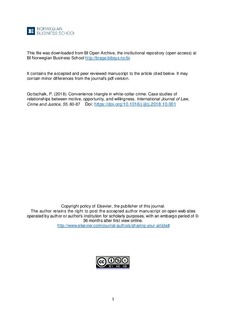Convenience triangle in white-collar crime: Case studies of relationships between motive, opportunity, and willingness
Journal article, Peer reviewed
Accepted version
Date
2018Metadata
Show full item recordCollections
- Publikasjoner fra CRIStin - BI [981]
- Scientific articles [2147]
Original version
International Journal of Law, Crime and Justice. 2018, 55, 80-87 10.1016/j.ijlcj.2018.10.001Abstract
The purpose of this article is to illustrate the potential relationships between motives, opportunities, and willingness to commit financial crime by white-collar offenders. We apply the theory of convenience to study six cases that link three constructs concerned with white-collar crime. For example, a strong motive for illegal profit or a strong willingness to commit financial crime can lead to opportunity expansion in an organizational context. The theory of convenience suggests that financial crime is a convenient option for white-collar offenders when there is an economical motive, an organizational opportunity, and a personal willingness. Convenience is defined as taking the handiest or easiest way to achieve a goal. Convenience orientation is conceptualized as the value that individuals place on actions with inherent characteristics of saving time and effort as well as avoiding pain, suffering, and uncertainty. The theory of convenience has three dimensions: (1) a desire for financial gain based on threats and possibilities, (2) an organizational opportunity to commit and conceal financial crime, and (3) a personal willingness for deviant behavior
